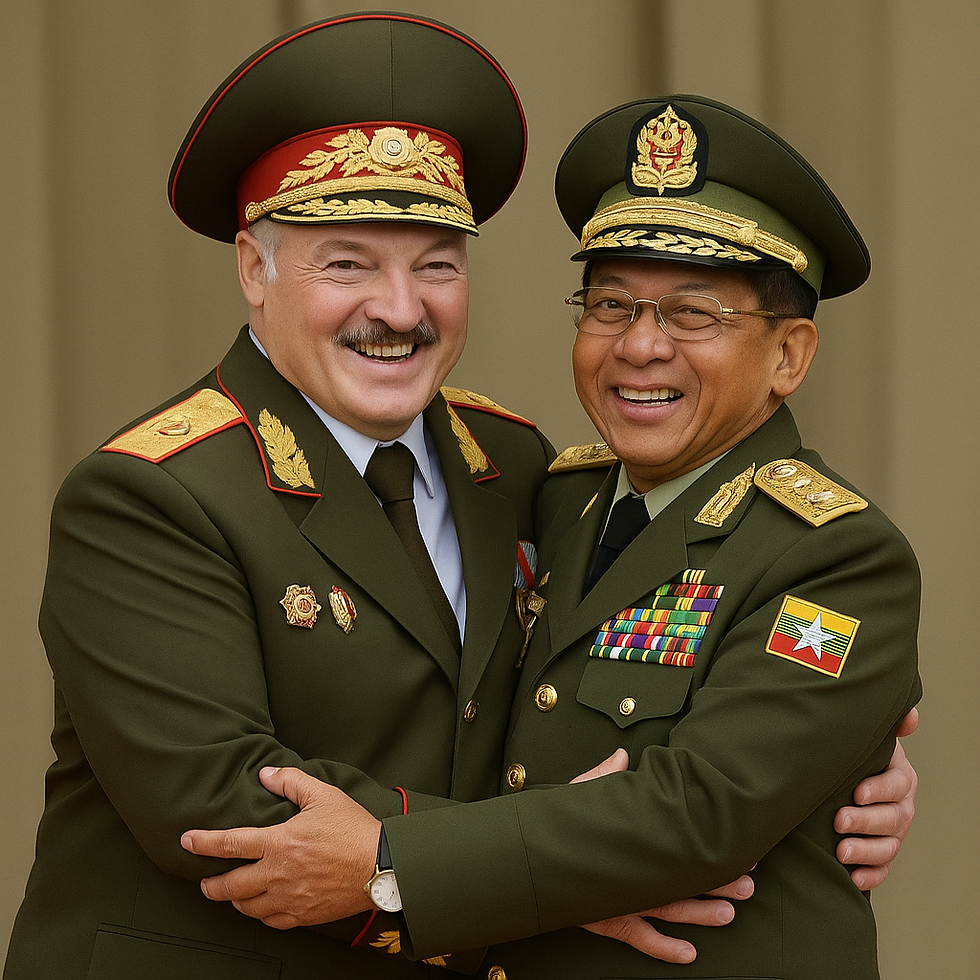The Authoritarian Brotherhood of Myanmar and Belarus
- Salidarnast Belarus
- Jul 23, 2025
- 4 min read
In the first half of 2025, political rapprochement between Belarus and Myanmar reached a new level. Both countries — governed by military or authoritarian regimes, under international sanctions, and widely criticized for systematic human rights violations — are enthusiastically expanding economic, diplomatic, and even military cooperation.

This is not a case of pragmatic diplomacy, but rather a political alliance between two repressive regimes, both of which are under scrutiny by the International Labour Organization (ILO) for their brutal repression of workers’ rights.
An Alliance Built in Isolation
From January to June 2025, Myanmar and Belarus held two business forums, in Yangon and Minsk respectively. Over 15 agreements were signed across various sectors, including agriculture, medicine, pharmaceuticals, fertilizer production, tractor assembly, and educational programs. Alongside this, both sides discussed expanding military cooperation — such as supplying air defense systems, training personnel, and sharing technologies.

At official meetings, dictators Alexander Lukashenko and Min Aung Hlaing made no attempt to conceal the strategic goals of their alliance. Their welcome speeches were filled with calls for a “long-term partnership,” “friendship between governments and peoples,” and “the development of defense ties.” But the discussions went far beyond trade — they also included exchanges of experience in election rigging, in suppressing public dissent, and most likely, in circumventing sanctions. After all, both dictators have many years of experience in exactly that.
Bound by Article 33
Belarus and Myanmar are among the few countries in the world against which the International Labour Organization has invoked Article 33 of the ILO Constitution — the ILO’s most severe sanction for persistent violations of fundamental workers’ rights and refusal to comply with its recommendations. This article has been applied only a handful of times in the ILO’s history. Myanmar was the first, in 2000, due to the widespread use of forced labor; Belarus was the second, in 2023, for its systematic destruction of independent trade unions and flagrant violations of ILO conventions.

In essence, both regimes perceive independent labor movements as existential threats. In both countries, trade union activists have been arrested, tortured, and criminally prosecuted. In Belarus, all independent trade unions were liquidated by 2022, and dozens of leaders were sentenced to prison. Myanmar's situation is no better — since the 2021 military coup, the country has been engulfed in violent suppression of all forms of dissent, including union activity.
Isolation as the Basis of Brotherhood
The rapprochement between Belarus and Myanmar is not the alliance of “emerging economies,” as propaganda outlets might claim, but rather the political solidarity of two pariah states. Isolated on the global stage, they are not seeking new markets so much as mutual political and ideological validation. It is a kind of “club of authoritarian misfits” built for self-preservation.
Moreover, this alliance enables the export of repressive practices and military cooperation that help the regimes evade sanctions. Officially, it is all conducted under the banners of trade and education; unofficially, it serves to consolidate authoritarian control and legitimize each other's rule. For instance, one agreement covers “mutual protection of classified information,” likely signaling deeper collaboration between security agencies.
These regimes are not merely violators of workers' rights — such examples abound globally — but are building a model of open defiance of international labor norms, in which workers are stripped of any real protection or voice.
A Challenge to the Global Labour Movement
In this context, the response of the international trade union movement is more crucial than ever. The strategic alliance of two authoritarian regimes poses a threat not only to their own populations but to the global architecture for protecting human and labor rights.

The appropriate response to the tightening grip of two dictatorships could be a concerted effort from labor organizations in Belarus and Myanmar — and potentially from unions worldwide — where similar struggles are part of daily life. A united front in solidarity and resistance could serve as a powerful counterweight to this growing authoritarian nexus.
“There are many authoritarian regimes all over the world. And unionists from many countries find exile and continue their struggle for freedom of association and democracy in their home countries. Today I am happy to announce that we have created a network of antiauthoritarian unionists in exile. By now we are colleagues from Hong Kong, Myanmar, Belarus and Vietnam joining our forces together”, — said Salidarnast leader Lizaveta Merliak at a May Day rally in Bremen this year. “Dictators back up each others’ regimes to get reed of us; but we the workers unite and learn from each other to fight back. We believe that the dictatorships will fall no matter how strong they may seem at the moment. Moreover, we believe that the workers will continue organizing for justice and peace”.





Comments